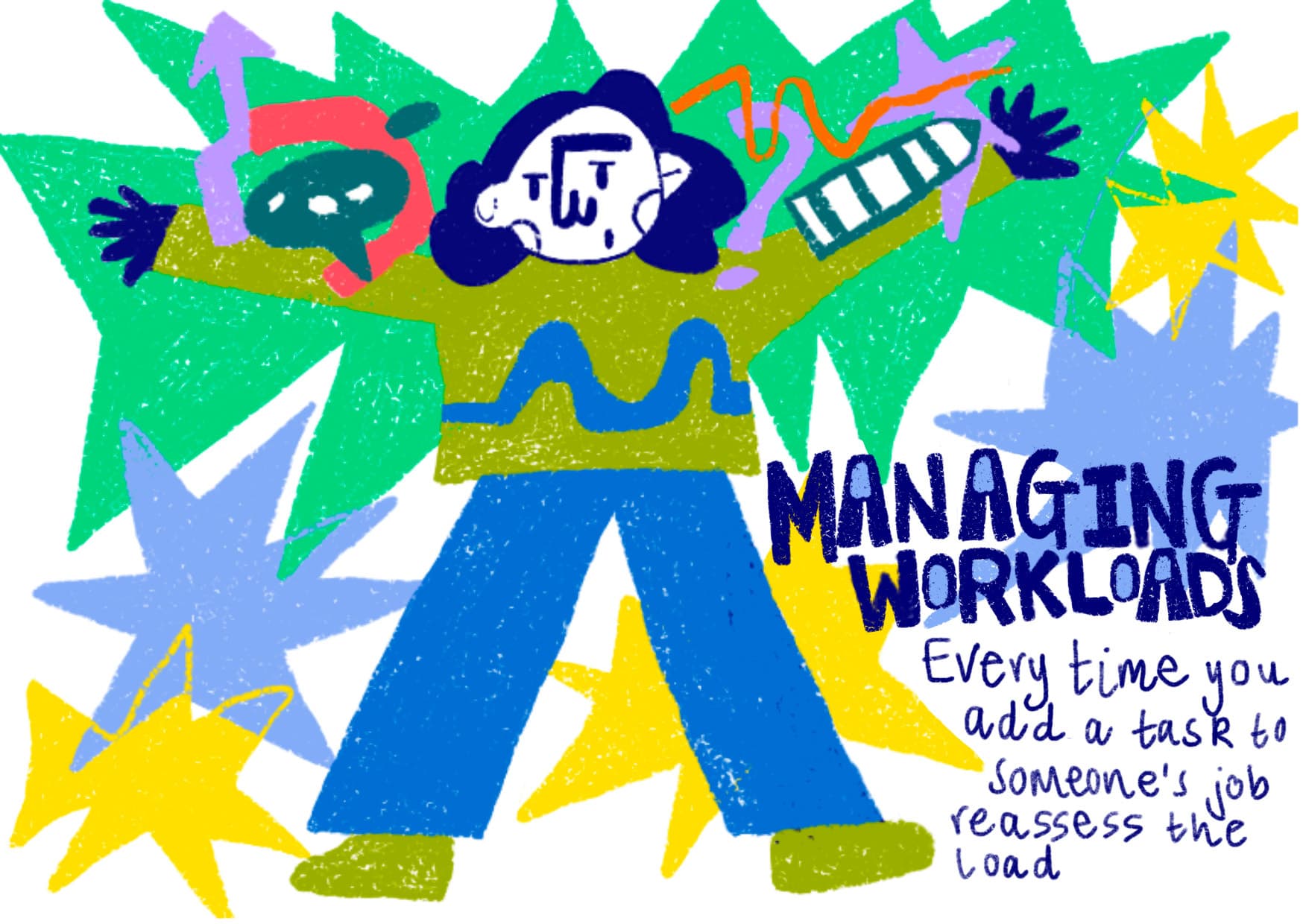Every Time You Add a Task to Someone’s Job, Reassess the Load
Checking the balance of work across your business will help everyone be their best instead of burning out.

If you would like a printed version of the entire series, then please contact us on hello@workwiseforscreen.org.uk
Mental wellbeing in the screen sector – too often a story of stress and burnout
A 2024 survey by The Film and TV Charity, found:
35% of workers in the industry suffer from poor mental health (higher than in other industries)
63% of workers said their mental health is affected negatively, and 64% have considered leaving the industry
Only 12% believe the screen industries is a mentally healthy place to work.
Why do the screen industries have such a problem?
A central factor is workloads and how they are managed.
High expectations and demands and the belief that workers should be able to produce large volumes of work at a fast pace.
Competing demands add to stress, with workers juggling many tasks, often with little support. The addition of another task could tip the balance into poor mental health.
High demands mean excessively long hours, minimal breaks, and sometimes long commutes.
The need to be on ‘top form’ and to deliver is difficult when there is little or no timely feedback. Having to produce multiple outputs to tight deadlines can be exhaustive.
The ‘feast or famine’ nature of production creates feelings of job insecurity and financial worry meaning workers take on multiple projects, so they have a liveable income.
What happens if we don’t find some solutions?
If workloads are not being managed, the consequences for the industry are worrying, including:
An increase in health conditions such as fatigue, sleep disturbances, increased substance misuse, anxiety, depression, and burnout.
Poor quality of work because of reduced motivation, engagement and cutting corners to get jobs done.
Recruitment and retention concerns for the industry in the long-term.
What can you do to manage workloads?
Good people management is critical.
This is not as easy as this sounds, and as many attest, this can be fiendishly difficult in practice due to the inherent tensions in the industry and the constant need to do more for less. But that is why open discussions between production managers and staff are key.
Have dedicated time set aside in projects to check-in properly. This is not a cursory, ‘how are you doing?’ for niceties, but a genuine conversation about an individual’s physical and mental wellbeing, and a discussion about workloads.
It means sense-checking whether work is under control, or whether there are concerns about deadlines being met. Ask questions such as: What is currently on your plate? Do you feel like you are juggling too many tasks? How can we make space for a task that is urgent?
Consider work allocation. If someone is already working on multiple tasks, if you give them something extra, what can be taken away? For example, if a worker is given a creative task to complete, can project administration be delegated elsewhere so they can focus on the main task in hand?
Enable open communication so workers feel comfortable enough to discuss workload pressures without worrying about repercussions. The more these conversations occur, the easier they can become.
Take a solutions-based approach. Can tasks be broken down to smaller bite-sized manageable tasks? Can a wider team pick up tasks? What is the main priority and what can wait?
By prioritising workload management, production managers will achieve both better results and worker wellbeing, a win: win situation for all.
This article is written by Dr Zofia Bajorek, Senior Research Fellow, Institute for Employment Studies.
The Institute for Employment Studies (IES) is an independent, apolitical, international centre of research and consultancy in public employment policy and HR management. It works closely with employers in all sectors, government departments, agencies, professional bodies and associations. IES is a focus of knowledge and practical experience in employment and training policy, the operation of labour markets, and HR planning and development. IES is a not-for-profit organisation.
Further reading:
Burnout in the Creative Industries: Why passion can’t replace healthy working conditions
I’m tired of the creative industries, and I’m sure you are too
How to Manage a Creative Team: 8 Strategies that Actually Work
How to Manage Performance for Creative Work
Gifford, J., Maxwell, G. and Young, J. (2021) Mental wellbeing and digital work: evidence summary. London: Chartered Institute of Personnel and Development.
Barends, E., Wietrak, E., Cioca, I. and Rousseau, D. (2021) Mental wellbeing and digital work: an evidence review. Scientific Summary. London: Chartered Institute of Personnel and Development.
Job quality in the Creative Industries: The final report from the Creative PEC’s Good Work Review